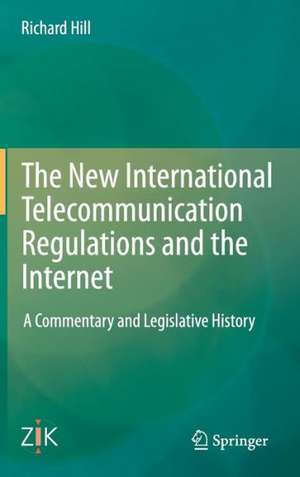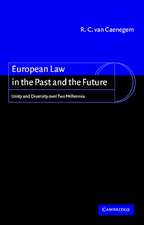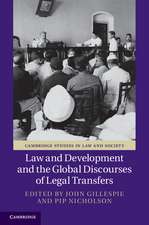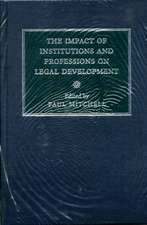The New International Telecommunication Regulations and the Internet: A Commentary and Legislative History
Autor Richard Hillen Limba Engleză Hardback – 10 apr 2014
The book covers in some detail the events leading to the non-signature of the treaty by a significant number of states, outlines possible consequences of that split between states, and offers possible ways forward. The book includes a detailed article-by-article analysis of the new ITRs, explaining their implications and concludes with recommendations for national authorities. It concludes with an analysis of events from the point of view of dispute resolution theory, offering suggestions for how to avoid divisive outcomes in the future.
"This is an excellent book, and quite rich and comprehensive. The topic is important and the book will surely be of interest to regulators, diplomats, policy experts, and all those who participated in WCIT. The author is uniquely qualified to write an analysis of the new ITRs and an account of the Conference. This book will be a good reference for the next Plenipotentiary Conference to be held in 2014 which is going to discuss follow-up to WCIT-12." Naser al-Rashedi, United Arab Emirates.
"This is an authoritative expert account of a moment of high significance for vital issues with respect to international networks." Professor Dan Schiller, University of Illinois.
"This isan excellent and timely work." Professor Ian Walden, Queen Mary, University of London.
"Interested persons, businesses and governments can draw their policies from the assessments of a telecommunications insider as presented in this book.
The manifold arguments enlightening the interpretation of the provisions of the ITRs might become an invaluable guidance for those who apply the ITRs in the future."
Professor Dr. Rolf H. Weber, University of Zurich.
| Toate formatele și edițiile | Preț | Express |
|---|---|---|
| Paperback (1) | 545.38 lei 38-44 zile | |
| Springer Berlin, Heidelberg – 27 sep 2016 | 545.38 lei 38-44 zile | |
| Hardback (1) | 641.85 lei 43-57 zile | |
| Springer Berlin, Heidelberg – 10 apr 2014 | 641.85 lei 43-57 zile |
Preț: 641.85 lei
Preț vechi: 755.13 lei
-15% Nou
Puncte Express: 963
Preț estimativ în valută:
122.81€ • 128.58$ • 101.62£
122.81€ • 128.58$ • 101.62£
Carte tipărită la comandă
Livrare economică 07-21 aprilie
Preluare comenzi: 021 569.72.76
Specificații
ISBN-13: 9783642454158
ISBN-10: 3642454151
Pagini: 200
Ilustrații: XVII, 173 p. 3 illus.
Dimensiuni: 155 x 235 x 25 mm
Greutate: 0.46 kg
Ediția:2014
Editura: Springer Berlin, Heidelberg
Colecția Springer
Locul publicării:Berlin, Heidelberg, Germany
ISBN-10: 3642454151
Pagini: 200
Ilustrații: XVII, 173 p. 3 illus.
Dimensiuni: 155 x 235 x 25 mm
Greutate: 0.46 kg
Ediția:2014
Editura: Springer Berlin, Heidelberg
Colecția Springer
Locul publicării:Berlin, Heidelberg, Germany
Public țintă
Professional/practitionerCuprins
History.- The 1988 International Telecommunication Regulations.- The Path to Revision.- What Happened at WCIT.- Overall Analysis of the 2012 treaty.- Article-by-Article Commentary.- Resolutions.- Conclusions and Implications for National Legislators and Regulators.
Recenzii
From the reviews:
“The New International Telecommunication Regulations and the Internet offers researchers a rare opportunity to better understand how international negotiations surrounding contentious technological questions take place. … the monograph highlights the role of the world’s oldest intergovernmental organization in managing the exchange of information between states. … This detailed account of the ITU’s history and role in navigating the controversial minefield of coordinating international information flows is a welcome addition to the body of empirical work on international communication and, specifically, Internet governance.” (Shawn Powers, International Journal of Communication, Vol. 8, 2014)
"This is an excellent book, and quite rich and comprehensive. The topic is important and the book will surely be of interest to regulators, diplomats, policy experts, and all those who participated in WCIT. The author is uniquely qualified to write an analysis of the new ITRs and an account of the Conference. This book will be a good reference for the next Plenipotentiary Conference to be held in 2014 which is going to discuss follow-up to WCIT-12." Naser al-Rashedi, United Arab Emirates.
"This is an authoritative expert account of a moment of high significance for vital issues with respect to international networks." Professor Dan Schiller, University of Illinois
"This is an excellent and timely work." Professor Ian Walden, Queen Mary, University of London
"Interested persons, businesses and governments can draw their policies from the assessments of a telecommunications insider as presented in this book. The manifold arguments enlightening the interpretation of the provisions of the ITRs might become an invaluable guidance for those who apply the ITRs in the future." Professor Dr. Rolf H. Weber, University of Zurich
"... The greatest value of the work lies in its systematic approach to describingthe process and the modifications of the text that took place. This legalistic approach succeeds in refuting or moderating many of the criticisms (or outright scare talk) that were made by Internet partisans during the process. On the whole it provides a more accurate view of what the new ITRs actually are and would actually do than most people have seen. But for better or worse, the tone of rancor that characterized the WCIT is still reflected in parts of this book..." Milton Mueller, igp Internet Governance Project, March 13, 2014
“The New International Telecommunication Regulations and the Internet offers researchers a rare opportunity to better understand how international negotiations surrounding contentious technological questions take place. … the monograph highlights the role of the world’s oldest intergovernmental organization in managing the exchange of information between states. … This detailed account of the ITU’s history and role in navigating the controversial minefield of coordinating international information flows is a welcome addition to the body of empirical work on international communication and, specifically, Internet governance.” (Shawn Powers, International Journal of Communication, Vol. 8, 2014)
"This is an excellent book, and quite rich and comprehensive. The topic is important and the book will surely be of interest to regulators, diplomats, policy experts, and all those who participated in WCIT. The author is uniquely qualified to write an analysis of the new ITRs and an account of the Conference. This book will be a good reference for the next Plenipotentiary Conference to be held in 2014 which is going to discuss follow-up to WCIT-12." Naser al-Rashedi, United Arab Emirates.
"This is an authoritative expert account of a moment of high significance for vital issues with respect to international networks." Professor Dan Schiller, University of Illinois
"This is an excellent and timely work." Professor Ian Walden, Queen Mary, University of London
"Interested persons, businesses and governments can draw their policies from the assessments of a telecommunications insider as presented in this book. The manifold arguments enlightening the interpretation of the provisions of the ITRs might become an invaluable guidance for those who apply the ITRs in the future." Professor Dr. Rolf H. Weber, University of Zurich
"... The greatest value of the work lies in its systematic approach to describingthe process and the modifications of the text that took place. This legalistic approach succeeds in refuting or moderating many of the criticisms (or outright scare talk) that were made by Internet partisans during the process. On the whole it provides a more accurate view of what the new ITRs actually are and would actually do than most people have seen. But for better or worse, the tone of rancor that characterized the WCIT is still reflected in parts of this book..." Milton Mueller, igp Internet Governance Project, March 13, 2014
Textul de pe ultima copertă
This book provides a clear and thorough account of the process leading up to the revision of the International Telecommunication Regulations (ITRs) one of the four treaties administered by the ITU. The author’s inside view of the events, and his legal analysis of the new ITRs, are different from that what has been aired in most other accounts to date. His systematic approach shows how much of the criticism of the WCIT-12 process, and of the ITRs themselves, is unjustified. This book provides the most accurate view to date of what the ITRs really mean and of what really happened at WCIT-12, which was undoubtedly a key event in the history of telecommunication policy and which is likely to have significant long-term effects.
The book covers in some detail the events leading to the non-signature of the treaty by a significant number of states, outlines possible consequences of that split between states, and offers possible ways forward. The book includes a detailed article-by-article analysis of the new ITRs, explaining their implications, and concludes with recommendations for national authorities. It concludes with an analysis of events from the point of view of dispute resolution theory, offering suggestions for how to avoid divisive outcomes in the future.
The book covers in some detail the events leading to the non-signature of the treaty by a significant number of states, outlines possible consequences of that split between states, and offers possible ways forward. The book includes a detailed article-by-article analysis of the new ITRs, explaining their implications, and concludes with recommendations for national authorities. It concludes with an analysis of events from the point of view of dispute resolution theory, offering suggestions for how to avoid divisive outcomes in the future.
Caracteristici
Article-by-article analysis of the new ITRs Of interest to anybody involved in telecommunication policy matters and international negotiations Provides an account of facts regarding the International Telecommunication Regulations (ITRs) Offers suggestions for how to avoid divisive outcomes in the future
















